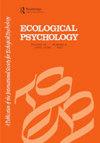Communication as Socially Extended Active Inference: An Ecological Approach to Communicative Behavior
IF 1.7
3区 心理学
Q3 PSYCHOLOGY, EXPERIMENTAL
引用次数: 9
Abstract
Abstract In this paper, we introduce an ecological account of communication according to which acts of communication are active inferences achieved by affecting the behavior of a target organism via the modification of its field of affordances. Constraining a target organism’s behavior constitutes a mechanism of socially extended active inference, allowing organisms to proactively regulate their inner states through the behavior of other organisms. In this general conception of communication, the type of cooperative communication characteristic of human communicative interaction is a way of constraining interaction dynamics toward the goals of a given joint action by constructing and altering shared fields of affordances. This account embraces a pragmatist view according to which communication is a form of action aiming to influence the behavior of a target, and stands against the traditional transmission view according to which communication fundamentally serves to convey information. Understanding acts of communication as active inference under an ecological interpretation allows us to link communicative and ultimately linguistic behavior to the biological imperative of minimizing free energy and to emphasize the action-oriented nature of communicative interaction.交际作为社会延伸的主动推理:交际行为的生态学方法
摘要在本文中,我们介绍了一种传播的生态学解释,根据该解释,传播行为是通过改变目标生物的可供性领域来影响其行为而实现的主动推断。约束目标生物体的行为构成了一种社会扩展的主动推理机制,允许生物体通过其他生物体的行为主动调节其内部状态。在这个一般的沟通概念中,人类沟通互动的合作沟通特征是通过构建和改变共同的可供性领域,将互动动态约束为特定共同行动的目标。根据实用主义的观点,传播是一种旨在影响目标行为的行动形式,而根据传统的传播观点,传播从根本上是为了传递信息。将交际行为理解为生态解释下的主动推理,使我们能够将交际行为和最终的语言行为与最小化自由能量的生物学命令联系起来,并强调交际互动的行动导向性质。
本文章由计算机程序翻译,如有差异,请以英文原文为准。
求助全文
约1分钟内获得全文
求助全文
来源期刊

Ecological Psychology
PSYCHOLOGY, EXPERIMENTAL-
CiteScore
3.30
自引率
10.50%
发文量
8
期刊介绍:
This unique journal publishes original articles that contribute to the understanding of psychological and behavioral processes as they occur within the ecological constraints of animal-environment systems. It focuses on problems of perception, action, cognition, communication, learning, development, and evolution in all species, to the extent that those problems derive from a consideration of whole animal-environment systems, rather than animals or their environments in isolation from each other. Significant contributions may come from such diverse fields as human experimental psychology, developmental/social psychology, animal behavior, human factors, fine arts, communication, computer science, philosophy, physical education and therapy, speech and hearing, and vision research.
 求助内容:
求助内容: 应助结果提醒方式:
应助结果提醒方式:


